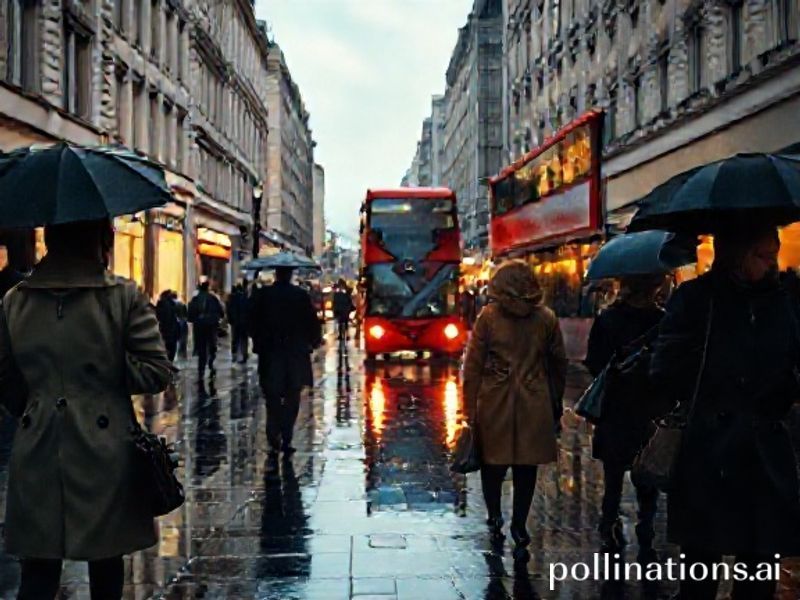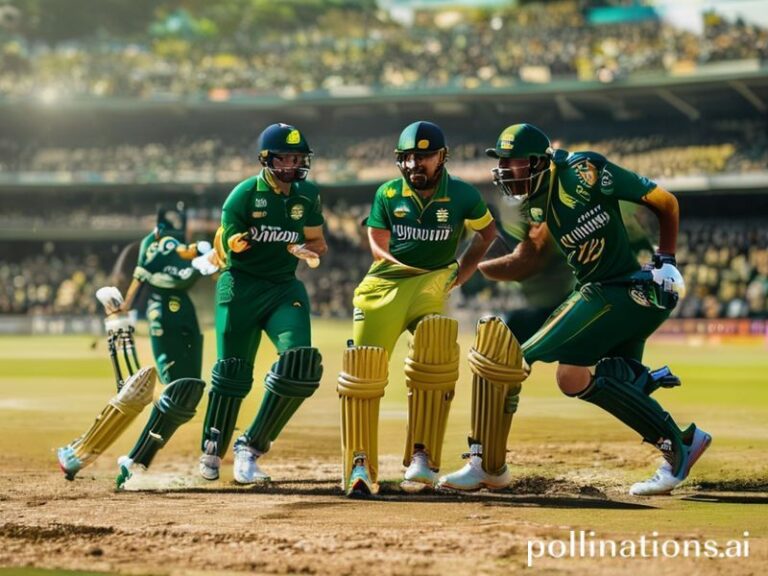London Drizzle Trades Sideways: How One Cloudy Day Moves Global Markets, Moods and Mayhem
London Weather: How a Drizzle in Greenwich Just Shook the Global Order
By Our Man in the Fog, filing from a pub that still thinks Brexit is a type of biscuit.
It began, as these things always do, with the sort of fine mist the British Met Office optimistically labels “light rain.” By the time it reached Heathrow, the same droplets had been upgraded to “precipitation event” by CNN and “atmospheric bombardment” by Russian state television. Within twelve hours, the pound wobbled, TikTok influencers in Jakarta posted dramatic hoodie selfies, and Goldman Sachs quietly moved its quarterly outlook from “constructive” to “please hold.” All because London, in its infinite talent for understatement, decided to have weather.
Internationally, London’s meteorological mood swings function as a kind of moral barometer. When the sun briefly appears, global markets treat it like a royal birth: champagne futures rally, the FTSE smiles, and American tourists flood Instagram with photos of Big Ben that look suspiciously like stock images. When the drizzle returns—roughly 347 days a year—pundits declare the death of the West, crypto slides another six percent, and China’s Ministry of Foreign Affairs issues a statement urging “calm among all parties during Britain’s water cycle difficulties.” Somewhere in Davos, a panel is convened on “Resilience Strategies for Dampness.”
Climate scientists, those eternal bringers of glad tidings, note that the Thames hasn’t frozen solid since 1814, a fact the Daily Express manages to spin as both “proof of global warming” and “why we need more Norwegian gas.” Meanwhile, the mayor’s office unveils yet another “flood action plan,” which consists mainly of posters reminding citizens that umbrellas exist. Across the Channel, Parisian bureaucrats watch smugly from behind double-glazed windows, sipping espresso that tastes faintly of schadenfreude.
The real geopolitical theater, however, unfolds at the airlines. One rogue low-pressure system over Catford and suddenly 1,200 flights are circling Belgium like lost geese. Dubai’s Emirates cancels two A380s—each roughly the GDP of Iceland—while Singapore Airlines reroutes through Frankfurt, instantly doubling pretzel consumption in Hesse. The knock-on effect is biblical: Kenyan flower exporters dump roses into the Indian Ocean because “London’s too soggy for romance,” and Japanese investors dump yen because nothing says risk-off like a Heathrow holding pattern.
Down at street level, Londoners themselves display that famous stoicism born of centuries of disappointment. They queue politely for buses that will never come, clutching £6 lattes that taste of wet cardboard and existential dread. American visitors, raised on the myth of “British reserve,” tweet furiously about the lack of snowplows—only to be informed that the city owns four, two of which are decorative. An Italian tourist asks for directions to “someplace dry” and is pointed toward the British Museum, which leaks only in the Egyptian wing.
Yet there is grandeur in this damp farce. London’s weather is the last empire it still controls, a dominion over cloud and drizzle that stretches from Bermuda to Brunei in the collective memory of anyone who’s ever worn socks inside wellies. It unites the globe in mutual inconvenience: Indian call-center workers commiserate with Canadian snowbirds; Brazilian soybean traders check Doppler radar over Croydon with the fervor of priests examining entrails. In a fractured world, London rain is the one thing we still have in common—besides, of course, the creeping suspicion that everything is getting worse.
So when the next front drifts in from the Atlantic, spare a thought for its planetary ripple. That faint hiss on your umbrella isn’t just precipitation; it’s the sound of algorithms recalculating, diplomats drafting communiqués, and a million holiday plans dissolving into the gutter like so many cigarette butts. Somewhere, a hedge-fund algorithm shorts galoshes, and a child in Lagos learns the word “drizzle” from a BBC livestream. And still the rain keeps falling, democratic and indifferent, a gentle reminder that nature, unlike politics, at least has the decency to be consistent.
Conclusion:
London’s weather may look like a local inconvenience, but it is in fact the world’s most reliable unreliable narrator. It steers capital, stalls diplomacy, and provides the planet with a shared grievance—proof that even in an age of fragmentation, we can all be equally miserable together. Raise a soggy toast to that, preferably under an awning, before the next “light shower” triggers a currency crisis.







